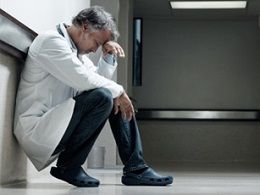Article
Burnout Among Plastic Surgeons
Author(s):
Exhaustion, depersonalization, and perceived lack of personal accomplishment-these are the signs of burnout, a syndrome that decreases efficacy at work.

Exhaustion, depersonalization, and perceived lack of personal accomplishment—these are the signs of burnout, a syndrome that decreases efficacy at work. Burnout is common in healthcare professions. In 2009, the American College of Surgeons (ACS) conducted a survey among its members. Nearly 8,000 surgeons responded, and almost 40% of them showed signs of burnout.
Researchers at the Feinberg School of Medicine at Northwestern University in Chicago set out to determine the incidence of burnout among a specific subset of surgeons—U.S. plastic surgeons. They looked for identifiable risk factors and burnout’s effect on quality of life using a validated survey tool. Their results, published ahead of print in the journal Plastic and Reconstructive Surgery, indicate that more than one-quarter of American plastic surgeons currently show symptoms of burn-out.
The researchers invited members of the American Society of Plastic Surgeons (ASPS) to complete a survey based on the Maslach Burnout Inventory anonymously between September 2010 and 2011.
Responses came from 1,691 actively practicing U.S. plastic surgeons, representing roughly 30% of the ASPS membership. Among respondents, 29.7% were assessed as having validated burnout—this is lower than the across-the-board rate identified in the ACS’s earlier study (that included all surgeons). Plastic surgeons generally see medically healthier patients than other surgeons, and this may contribute to this statistic.
Significant risk factors for burnout included subspecialty, number of hours worked per week, night calls per week, annual income, practice setting, and academic rank. Practicing in microsurgery or aesthetics doubled the risk of burnout. Surgeons on-call more than 2 nights per week experienced greater burnout. For surgeons practicing in academic settings, lower academic rank or being department chair were associated with greater risk of burnout. Non-salaried compensation also increased burnout.
Approximately one-quarter of plastic surgeons had significantly lower quality of life than the average US citizen. Burnout was associated with lower career satisfaction and more work-home conflicts. These surgeons were also at almost double the risk of self-reported medical errors and self-reported impairment.
Over one-fourth of plastic surgeons in the US experience validated burnout. Understanding how and why burnout occurs can help plastic surgeons and their employers take step to avoid it and ensure good quality of life.





